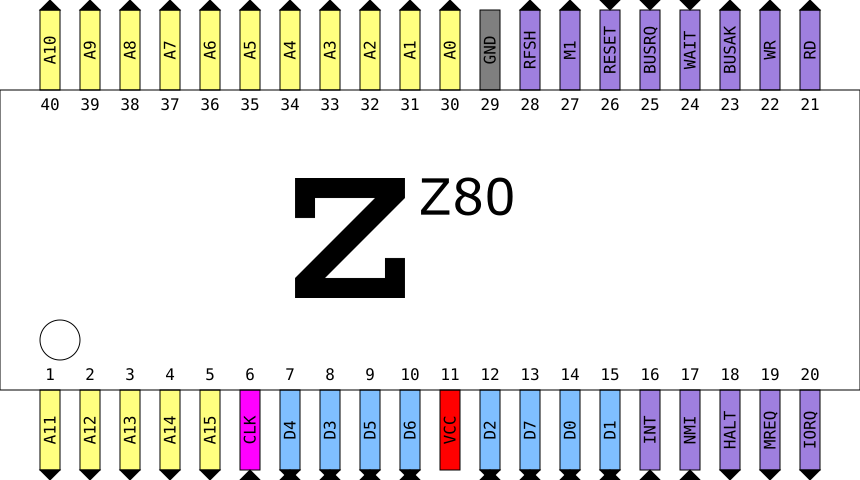Z80: Difference between revisions
Jump to navigation
Jump to search
mNo edit summary |
mNo edit summary |
||
| Line 1: | Line 1: | ||
[[File:cd2_z80.jpg|right|thumb|Z80 in a surface mount package, as found | [[File:cd2_z80.jpg|right|thumb|Z80 in a surface mount package, as found on some MVS and CD boards.]] | ||
The Z80 is an 8-bit little-endian CPU designed by Zilog. | The Z80 is an 8-bit little-endian CPU designed by Zilog. | ||
All NeoGeo systems use it to handle sound and music playback. It runs at [[clock|4MHz]] and only has access to the {{Chipname|YM2610}}, {{Chipname|M1 ROM}} or [[Z80 file]]s, and its [[Z80 RAM|own RAM]]. | All NeoGeo systems use it to handle sound and music playback. It runs at [[clock|4MHz]] and only has access to the {{Chipname|YM2610}}, {{Chipname|M1 ROM}} or [[Z80 file]]s, and its [[Z80 RAM|own RAM]]. It communicates with the {{Chipname|68k}} CPU via a [[68k/Z80 communication|single-byte channel]]. | ||
Since it doesn't share a RAM area with the 68k CPU like on the Sega Genesis, it can't be used efficiently as an auxiliary CPU to perform gameplay or video related tasks. | |||
Also see: | |||
* [[Z80 memory map]] | |||
* [[Z80 port map]] | |||
* [[Z80 bankswitching]] | |||
[[File:aes_z80.jpg|right|thumb|Z80 in DIP package, as found on AES boards.]] | [[File:aes_z80.jpg|right|thumb|Z80 in DIP package, as found on AES boards.]] | ||
Revision as of 03:45, 21 September 2018

The Z80 is an 8-bit little-endian CPU designed by Zilog.
All NeoGeo systems use it to handle sound and music playback. It runs at 4MHz and only has access to the YM2610, M1 ROM or Z80 files, and its own RAM. It communicates with the 68k CPU via a single-byte channel.
Since it doesn't share a RAM area with the 68k CPU like on the Sega Genesis, it can't be used efficiently as an auxiliary CPU to perform gameplay or video related tasks.
Also see:

Pinout
Datasheet
Z8400 datasheet: [[1]]
